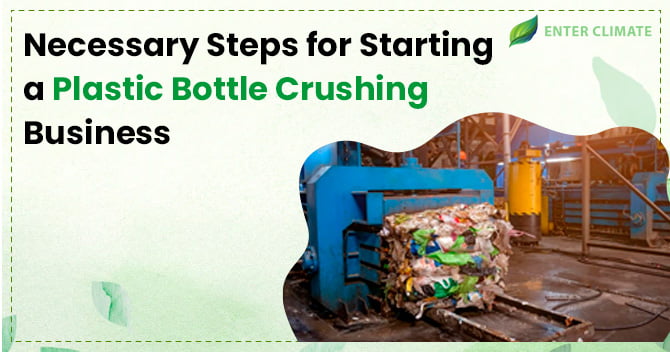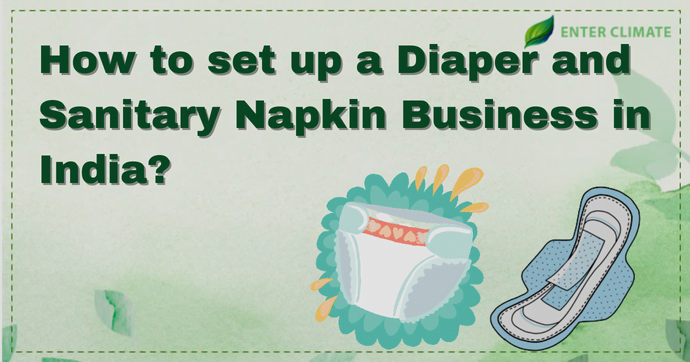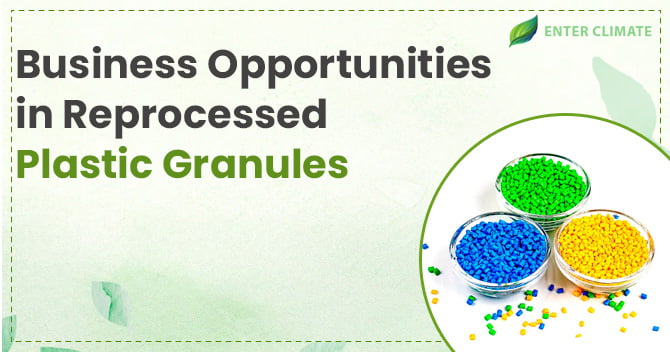Necessary Steps for Starting a Plastic Bottle Crushing Business
 29 Jul, 2022
29 Jul, 2022 
The plastic bottle crushing business is a lucrative segment in the plastic waste recycling sector. Anyone who works in the plastic recycling business knows the value of PET plastic and its demand in the manufacturing industry. A plastic bottle body is primarily made of PET plastic, while the bottle caps are made of some other plastic. There are different categories of plastic used in the manufacturing of plastic bottles. It depends on the product being packaged in it, like HDPE (found in the form of shampoo bottles, bleach bottles, motor oil bottles etc.), LDPE (found as dispensing and squeeze bottles), PP (polypropylene which is used in the packaging of chemicals and alcohol), and even polystyrene. As plastic bottle crushing is a physical process involving cleaning and bailing of plastic, the machinery involved is limited, and the business can be started at almost any location. The most significant advantage of this business is the easy availability of raw materials, i.e. plastic bottles. Local kabadiwalas and raddiwalas mainly do the collection and sorting of plastic bottles. Bottles used to pack water, bottles used to pack FMGC products, medicines bottles etc., are collected from discarded waste by ragpickers and delivered to small and big waste traders.
How Plastic Bottle Crushing Business works
Purchasing Discarded Plastic Bottles: A Plastic Bottle Crushing Business starts by purchasing sorted bottles. This step involves checking the composition and condition of the bottles by analysing a few samples. Different categories of plastic bottles at low prices are readily available, and the supply is also abundant. In the bottle crushing facility, the caps and ring from the bottles can be removed and then cold-washed, or the bottles can be sent to washing directly. After these preprocessing stages, plastic bottles can be directly fed into the crushing and bailing machines.
Washing of Plastic Bottles: Discarded Plastic bottles need to be washed to remove the bottle’s dust, oil, and remains before it is crushed. This step is required as washing bottles becomes difficult after bailing. Moreover, washed plastic bottles also fetch a greater price in the market.
Crushing of the Bottles: The bottles are fed into bailing machines from the top, and a hydraulically operated pressing hand of the machine crushes the bottles into cuboidal stacks of bailed plastic. The capacity of the machines depends on the working pressure of the bailing press and the power pack used. The size and weight of bales can be altered according to the demand, but it is usually kept at 100 kgs for convenience. These bales are then tied with metal wires and sent to the buyers.
Requirements in Plastic Bottle Crushing Business
Step 1: Creating a Business Structure
Before starting any waste management business, the business’s structure and requirements must be analysed. Any entrepreneur must ask himself questions like what should be my unit’s capacity, how much I can readily invest, how many employees I will need, and what are the possibilities for expanding my business in the future. Answers to such questions will help the entrepreneur understand different modalities of the business like the required structure of the unit, time and resources needed, capital requirement and the mandatory registrations and authorisations to get.
Step 2: Registering your business
Any industrial unit, small or big, needs to register itself. A bottle crushing business can be a tiny industrial unit whose expenditure on machinery and plant does not exceed 25 lakhs or a small-scale industry(SSI) whose investment in plant and machinery (original cost) is under one crore. Under the SSI Registration Scheme of the government, DIC (District Industries Centre) is the registering authority. Following legalities must be dealt with before starting a bottle-crushing business.
Company Incorporation Certificate: Obtaining an incorporation certificate from the respective authority must be done after deciding the legal structure of the business, which can be any one of the following
- One Person Company
- Sole proprietorship
- LLP
- Private Limited Company
- Partnership firm
GST registration: GSTIN is compulsory for every business with inter-state business activities or has an annual turnover of 40 lakhs and above.
Registration under Factories Act: Registration under Factories Act, 1948[1] must be obtained by a plastic crushing business as it regulates the working condition in factories and deals with various problems concerning the workers’ safety, health and efficiency.
NOCs from Pollution Control Board: A Plastic crushing business has to obtain consent from their respective State Pollution Control Boards or Pollution Control Committees under the Air Act and Water Act. The Consent Certification is generally provided in two stages, i.e. Consent to Establish (CTE) and Consent to Operate (CTO). SPCB does a site inspection to ensure that the unit has complied with all measures to conform to environmental regulations and has installed necessary Pollution Control Devices. The Plastic Bottle crushing business can coordinate with experts that provide services to simplify and accelerate all the registration and consent requirements and can help your business with documentation and necessary legal compliances.
Step 3: Sourcing Machinery and Labour: Purchasing Machinery needed for the business can be easily done as there are a lot of local and overseas manufacturers. Major equipment needed for a Plastic bottle crushing business is plastic bottle bailing machines and a washing line. The workforce requirement is also minimal, and even unskilled workers can be trained easily to operate the machines.
Scope of Plastic Bottle Crushing Business
- Plastic bottles are crushed into 100 to 140 kg cuboidal bales and can be transported to other recycling units that shred, grind, and reform the waste plastic into plastic granules.
- The demand and, therefore, the profit in the business depends on the category of crushed plastic bottles. The same machinery can bail all kinds of plastic. Still, most businesses opt for bailing PET bottles simply due to the high recyclability and demand for PET plastic. With over 0.9 lakh tonnes of PET manufactured in India annually, around 90% of the PET bottle scrap gets recycled.
- One can start a plastic bottle crushing business relatively easily with small capital investment and later expand the unit to include plastic shredding and plastic granule manufacturing.
Time and cost involved in starting a Plastic Bottle crushing Business
Though the time needed for setting up a plastic bottle-crushing business is not significant, it will depend on how efficiently the person handles the registration and authorisation requirements. When it comes to the cost, factors like investment in capital assets, capacity required to be installed, wages of the workforce, consumables like water and electricity and any non-capital assets, if required, will decide the investment needed. By a rough estimate, a small capacity plastic bottle crushing business can be set up within ten lakhs.
Conclusion
Plastic bottles are used for packaging a variety of products nowadays. The government has also tried to reform the sector by introducing EPR Authorisation for manufacturers of plastic packaging items (like plastic bottles)through the amendment to the Plastic WasteManagement Rules in February 2022. This step will likely boost related industries, such as the plastic bottle crushing business, as the PIBOs will need registered units to meet their targets. Another critical development in the sector was the non-inclusion of plastic bottles from the list of SUP items that got banned. The government rather directed the PIBOs to recycle the plastic packaging they produced under their EPR obligations, which is a win for industries involved in the plastic bottle crushing business.
Read our Article:Overview of EPR Action Plan for Plastic Waste













